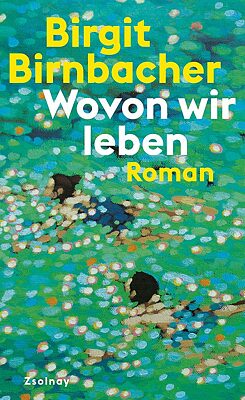Birgit Birnbacher
Staying power
Julia suffers from asthma. And she has just lost her job. Back in the village where she grew up, she is struggling to make a fresh start. But that’s not possible without confronting the demands and expectations of her family and the drab reality of village life. When Julia meets the “guy from the city”, a glimmer of hope emerges amid all the hopelessness.
By Marit Borcherding
Always give more than you take – by the fourth sentence of the novel Wovon wir leben (What we live from), the protagonist Julia is already telling herself that this is exactly how she must allow air, the elixir of life, to flow through her body. Known as complete breathing, this is a technique that it is essential for the asthma sufferer to apply. An instruction to herself, it could serve at the same time as a motto for the slim novel as a whole, which focuses especially on the caregiving work done by women. And which is about work in general – and what losing it does with people.
What does unemployment do with people?
It may come as a surprise to find a novelist citing the social psychologist Marie Jahoda, one of the authors of Marienthal: The Sociography of an Unemployed Community, a study that is regarded as a classic in the field of empirical sociology; though only until one learns that Birgit Birnbacher herself has a degree in sociology and social sciences, as well as practical experience in community and neighbourhood work. During the course of her studies, she must also have looked at the effects of prolonged unemployment, as the Marienthal study did. After all, she addresses this and other issues in poetic style in her novel. Wovon wir leben asks existential questions and answers them with empathetic and finely drawn stories: What defines us? What do we mean by a successful life, and do we have the means to contribute something to it? What in fact is important, and how can we achieve it? In a nutshell: What do we live from?A case study of caregiving
Julia Noch, the first-person narrator, was a devoted nurse until she made a fatal error while treating a patient. The patient survives but Julia loses her job nonetheless. Demoralized in any case because she is upset about her affair with a married doctor, who dictates the conditions under which they can be together, and worn out by her chronic asthma, Julia can think of no other option but to return to her home village. Her father, a patriarch and hypochondriac, initially conceals the news that her mother has left. She, who uncomplainingly, self-sacrificingly and borderline obsessively had always taken care of everyone, has not only found gainful employment for herself, but also moved to Italy. To the country where the lemon trees blossom and which in other respects also offers more promise than the bleak Austrian village blighted by unemployment. People there drink too much, say too little and wallow in pointless lament. Faced with her passive-aggressive and self-pitying father, Julia, who has come home to be comforted, pampered and cheered up, finds herself in a conflict: “What I have to decide here immediately is whether to look after him and get involved, or to demand that he looks after me, and then be annoyed every day that it is too little. And how these two scenarios fluctuate, how unclear it is ... who is or will be more needy.”It is impressive how Birgit Birnbacher manages in fewer than 190 pages not only to depict the entanglements of parent-child dynamics in entrenched relationship patterns with such incisiveness, but also to use a whole cast of characters, not to mention animals, to portray societal conditions that tell of cemented unhappiness, shattered dreams and inadequacies, but also of attempts to fight one’s way out of seemingly hopeless situations: we have Julia’s brother, whose physical and mental disability could have been prevented if the father had not insisted on his interpretation of the situation; we have Julia’s mother, who has learnt in Italy to laugh and to sail, but ultimately finds herself stuck behind the living room window again; we have Julia’s friend Bea, who wants to use her job to break free of village life but lets her despondency beat her in the end; we have a goat that is bleating torturously in distress and that Julia successfully looks after; the cadaver of a cow that stinks appallingly and that is also disposed of thanks to Julia; an inn that is transformed from a place lacking entirely in any cheer to an auspicious future forum for community get-togethers.
An alternative concept
The person responsible for this latter shift to a more positive outlook is the “guy from the city”, whose real name is Oskar and whom Julia meets directly upon returning to the village. He is recuperating in a clinic following a heart attack. Even more importantly, however, he has won a basic income for one year. This gives him freedoms that he knows how to take advantage of, and the author the opportunity to sketch out certain lifestyle choices that seem literally utopian in nature by comparison with the usual village circumstances: “This idea of work as cooperation. This idea of doing something of one’s own accord, for oneself. This idea of doing something together, of having something to do together. And with the environment surrounding one … Of believing in what lies ahead of one. Of believing something that may perhaps never exist … ‘These are the things we live from after all,’ he says.”Of course, this is not the moment that the novel executes an about-turn and heads towards a happy ending, as too much befalls Julia for this to happen – even as the book draws to a close; she has suffered too much for that and is too sceptical, too critical. However, she now asks herself many questions, switches viewpoints in her thoughts, plays through possibilities, alone and together with Oskar. In this way she expands her scope for action – and creates for herself the foundations upon which to also enjoy freedom, however much she may feel that everything is predetermined. Hopefully, one empathetically thinks while reading the final few pages, she will be able to retain this perspective.
Birgit Birnbacher: Wovon wir leben. Roman
Wien: Zsolnay, 2023. 192 S.
ISBN 978-3-552-07335-7
You can find this title in our eLibrary Onleihe.

